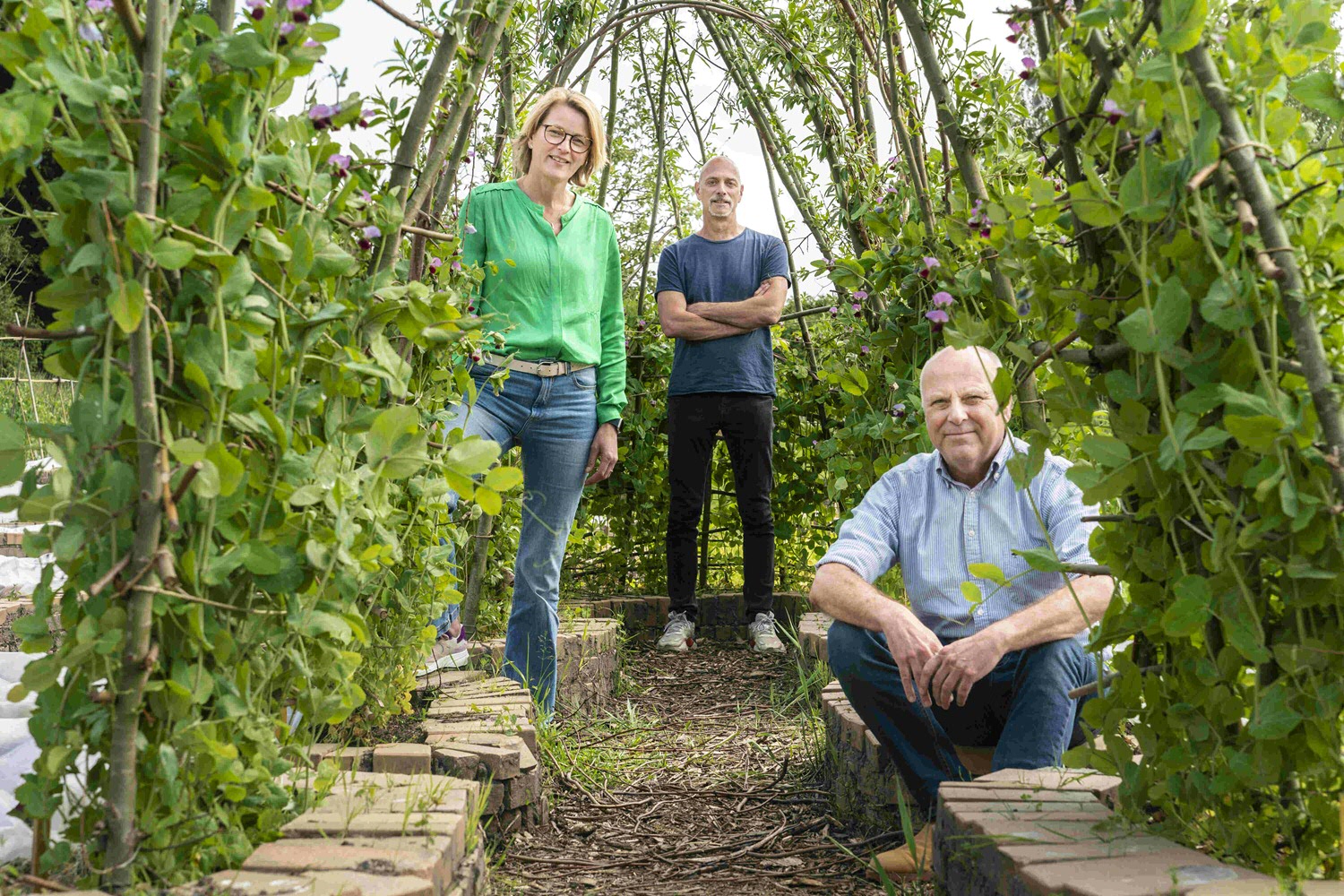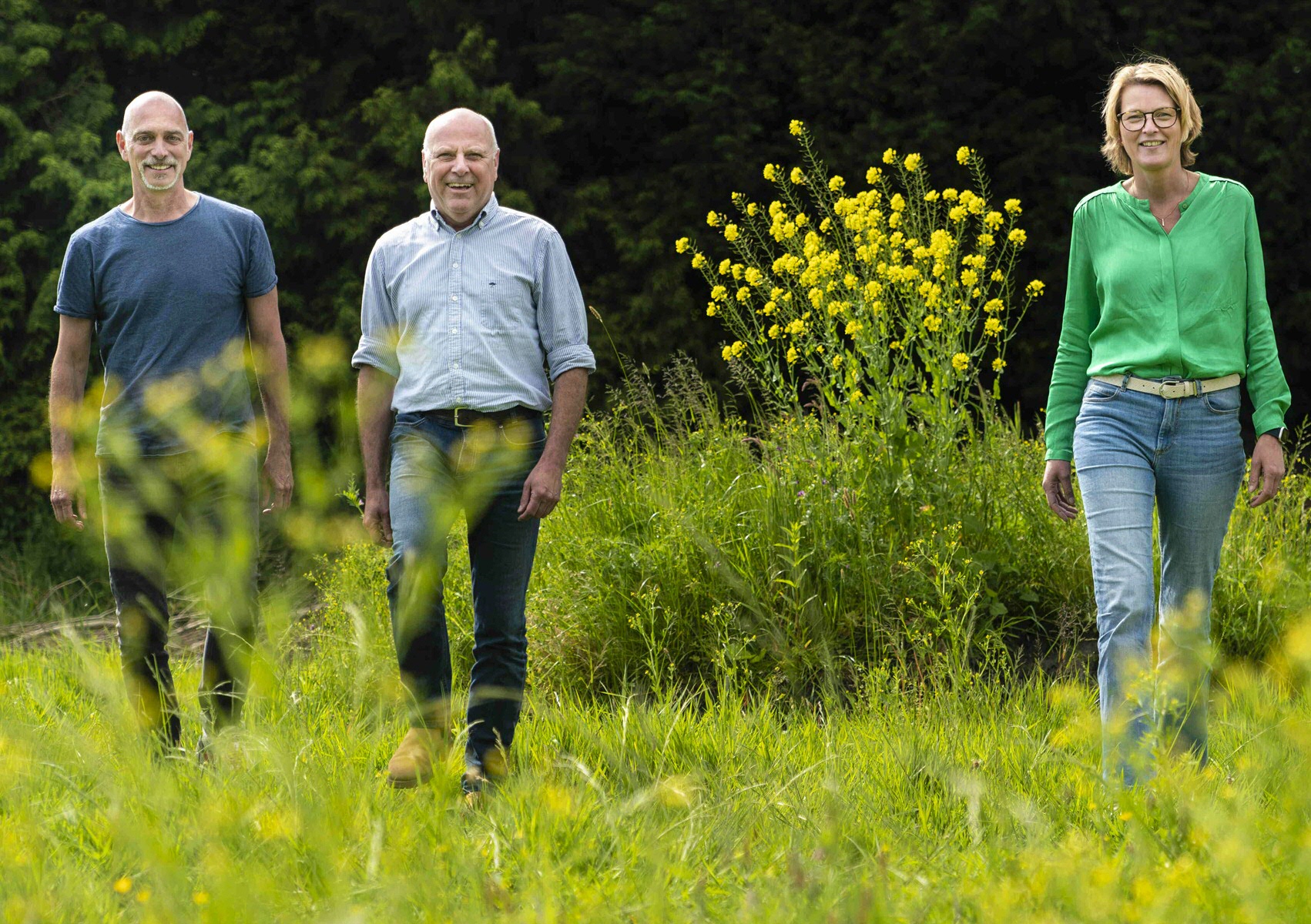Wholeheartedly towards a plant-based society
Rob van Haren (Hanze UAS), Bianca Harms (NHL Stenden UAS), and John Hoeks (UG) work at different institutions, but have an unmistakable passion in common. Supported by the University of the North Booster Fund, the trio wants to speed up the transition to a plant-based society. ‘Our end goal is clear, but we have to get there with small steps. We have faith in the power of health, sustainability, and ethics.’ Their project has been nominated for the election Sustainable Thirty, organized by Dagblad van het Noorden, the Leeuwarder Courant and the Friesch Dagblad.
Text: Riepko Buikema, UG Communication department; Photographs: Reyer Boxem

Would it not show strength, asks Van Haren, if we start close to home? Right here, at the shining House of Connections, the inspirational home base for the Schools and the University of the North. ‘How amazing would it be if the House of Connections would go fully vegan? As an example, as a statement. We would like to call for a coherent vision on sustainability for the four Schools. Our initiative can aid in the transition to a new, plant-based reality. To practice what we preach. I'll bring the ‘kroketten’ made of seaweed or lupin.’
Unite and strengthen
That is how Hanze lecturer of Transition to Circular Bioeconomy expresses the ideals of TRANS-PLANT, a collaboration which aims to map, unite, and strengthen small-scale, plant-based initiatives in the North. Think of projects like permaculture, urban farming, public gardens, food forests, farmer's markets, community-supported agriculture, and veggie boxes.
‘There are promising initiatives in the North’, says Hoeks, UG professor of Communication and Information Sciences, who specializes in sustainability. ‘I've seen it with my own eyes. At De Blije Bodem for example, a regenerative, fully plant-based self-harvest garden in Groningen which also has a social function. We want to strengthen and increase awareness of such initiatives. By combining many small projects we can have the same impact as big agriculture.’
Students
The inventory is aimed at gaining insight into the hurdles which plant-based pioneers face and to remove them by means of research and efforts from students. ‘It is often difficult for these trailblazers to grow’, says Harms, lecturer of Transformational Media at NHL Stenden. ‘Our students are perfectly capable of tackling these issues, and this leads to the rise of meaningful living labs.’
Our duty
That should bring human-worthy and planet-friendly food closer to us. And we are pressed for time, says Hoeks. ‘Climate change is very urgent. All hands on deck! Only today I read an article in renowned scientific magazine The Lancet, in which researchers are calling on universities to take charge on the road to a plant-based society. That perfectly fits the University of the North, as the place where education, research, and many students convene. It is our duty to take the lead.’
Van Haren: ‘We want to take the animals out of the food chain, to liberate them. That is also better for our climate and the environment. Animal products have many disadvantages: methane emissions, nitrogen, deforestation, pollution, you name it. For every kilo of Dutch cheese, 0.88 square meters of rainforest dies. On top of that, many large international parties handle animals with an almost complete lack of conscience. ‘Taking the animals out of the food chain’ has a double meaning, then. And don't forget, Hoeks adds, ‘Plant-based equals wholesome. Scientific research has shown that a plant-based diet provides sufficient nutrients.’

Immeasurable value
Their collaboration is based on personal convictions and shared driving forces. Hoeks and Harms met through online vegan communities and considered The University of the North Booster Fund as a perfect opportunity to finally conduct research together. They involved Van Haren in this, who is just as passionate and has been blessed with a good dose of humour. From then on they have formed a trio that can build on a variety of expertise. This has proven to be of immeasurable value.
The power of health
‘The transition to a plant-based society is a complex topic’, says Harms. ‘The eating of animal products is deeply embedded in our culture and a plant-based lifestyle evokes a lot of emotions. But our approach is not anti-meat. We emphasize the power of health, sustainability, and ethics.’ She considers the subsidy from the Booster Fund a wonderful recognition, particularly in the Northern Netherlands, with its agricultural provinces of Fryslân, Drenthe, and Groningen. ‘Wonderful ideas about an alternative agricultural future are being thought up here, based on all the knowledge that is available.’
Higher purpose
The first concrete goal for TRANS-PLANT is a map full of plant-based initiatives, with characteristics described and contact information. Besides that, the trio wants to use their first subsidy to apply for an even bigger subsidy, possibly to join an initiative for alternative food chains on a European level. Harms: ‘And we are striving for a living network in the North, with living labs for students, who work on plant-based issues under supervision. That way, they will experience the power of using expertise for a higher purpose during their studies.’
More information
- Voting for the Sustainable Thirty (for subscribers of Dagblad van het Noorden, the Leeuwarder Courant and the Friesch Dagblad) can be done on the websites of the newspapers.
- Contact: John Hoeks
| Last modified: | 14 June 2023 12.34 p.m. |
More news
-
24 March 2025
UG 28th in World's Most International Universities 2025 rankings
The University of Groningen has been ranked 28th in the World's Most International Universities 2025 by Times Higher Education. With this, the UG leaves behind institutions such as MIT and Harvard. The 28th place marks an increase of five places: in...
-
12 March 2025
Breaking news: local journalism is alive
Local journalism is alive, still plays an important role in our lives and definitely has a future. In fact, local journalism can play a more crucial role than ever in creating our sense of community. But for that to happen, journalists will have to...
-
11 March 2025
Student challenge: Starting Stories
The Challenge Starting Stories dares you to think about the beginning of recent novels for ten days.
